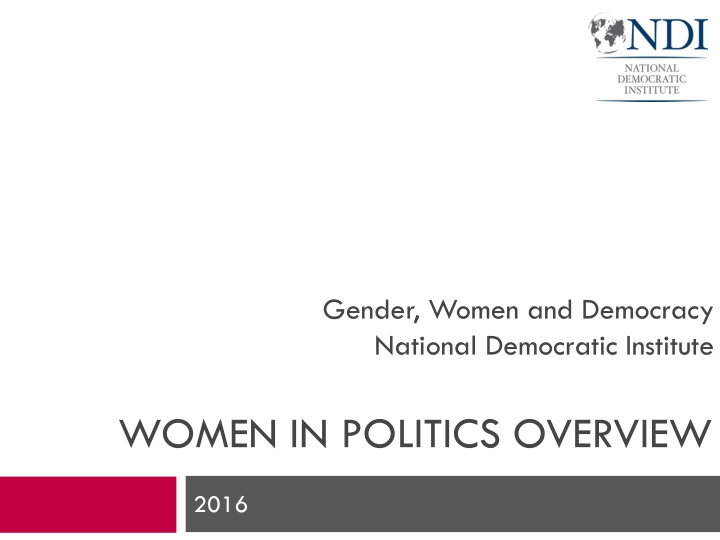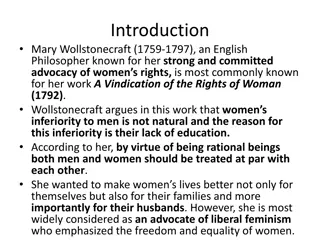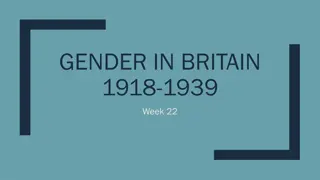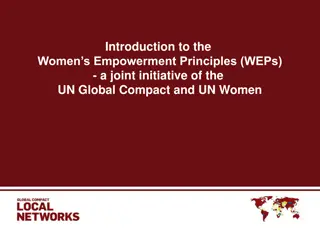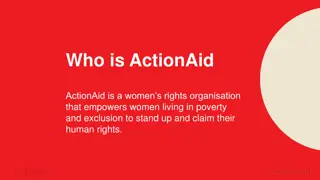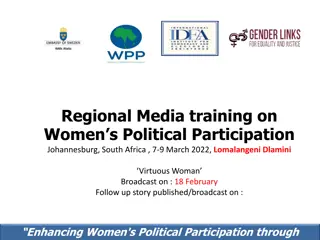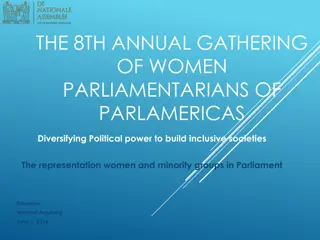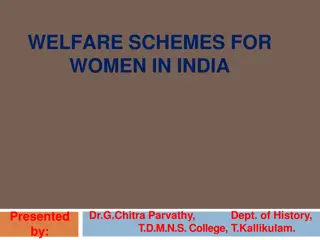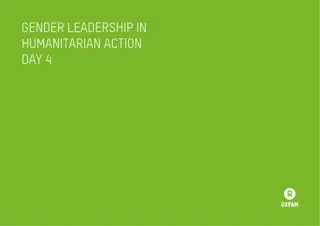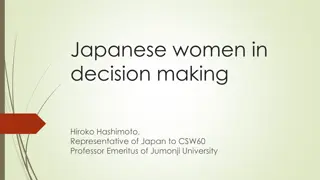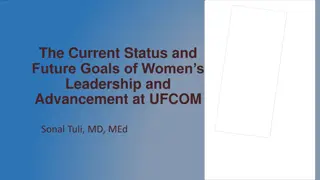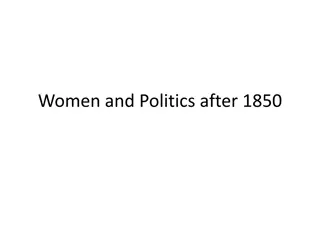Women in Politics: Empowering Change through Participation
Women's political participation is essential for vibrant democracies. Despite progress, significant challenges remain in achieving gender equality in political spheres worldwide. This overview highlights the importance of women's involvement in decision-making processes, the need for supportive legal frameworks, and ongoing global trends affecting women's rights and empowerment.
Download Presentation

Please find below an Image/Link to download the presentation.
The content on the website is provided AS IS for your information and personal use only. It may not be sold, licensed, or shared on other websites without obtaining consent from the author.If you encounter any issues during the download, it is possible that the publisher has removed the file from their server.
You are allowed to download the files provided on this website for personal or commercial use, subject to the condition that they are used lawfully. All files are the property of their respective owners.
The content on the website is provided AS IS for your information and personal use only. It may not be sold, licensed, or shared on other websites without obtaining consent from the author.
E N D
Presentation Transcript
Gender, Women and Democracy National Democratic Institute WOMEN IN POLITICS OVERVIEW 2016
WOMEN IN POLITICS OVERVIEW: OBJECTIVES Understand the need for women s political participation and the related legal framework within global, regional and country-specific contexts
WOMEN IN POLITICS: OVERVIEW Women are a key part of democracies, not just as individuals, but through their collective influence. It is critical that women can participate in all areas of public life: civil society, political parties, electoral processes and governing bodies
WOMEN IN POLITICS: OVERVIEW Women are a key part of democracies, not just as individuals, but through their collective influence. It is important for women to work in networks in order to advocate for change, types may include: Women s Wings Women s Parliamentary Caucuses Women s Coalitions/Cross-Sector Women s Networks
WOMEN IN POLITICS: OVERVIEW Although there has been advancement in broader participation and many successful activities have been implemented, larger, sustainable shifts in attitudes, policy and institutions have not taken place within the political sphere.
Global Trends for Women Reaching parity in primary education but 2/3 of illiterate adults are women Women s wages are 70-90 percent those of men Women spend at least twice as much time as men on domestic work Source: UN The World s Women 2010: Trends and Statistics
Global Trends for Women 1 in 3 women globally have experienced violence. Source: UN Women Gender digital divide: women are less likely to have access to, or the education to use, technology Source: World Bank: Bridging the Gender Digital Divide Women are more likely than men to live in poverty
Global Trends for Women As of January 2014, women occupied 22.2% of seats in national legislatures Rwanda has the highest percentage of women in parliament, at 64% The UN estimates that globally women are about 27 percent of judges worldwide 43 countries (23%) have reached or surpassed a threshold of 30% women in the single or lower houses of their national parliaments
Global Trends for Women Globally, there are 37 countries in which women account for less than 10% of parliamentarians in single or lower houses, as of August 2015, including 6 chambers with no women at all Globally, women hold16.7% of ministerial posts 11 heads of state are women 13 heads of government are women
EXERCISE: Brainstorm Benefits WHY WOMEN? Barriers Results
The Benefits of Women in Politics There is strong evidence that shows that more women in elected office leads to: Higher standards of living The concerns of marginalized voters being represented More collaborative leadership styles Working across party lines Stronger peace-building efforts
Benefits: Higher Standards & Concerns of Women and Other Marginalized Groups In a survey of 187 women who hold public office in 65 countries, researchers found that 90% of women believe they have a responsibility to represent women s interests and advocate for other members of society Source: UNICEF (2006) In Argentina, despite only representing 14% of deputies, women parliamentarians introduced no fewer than 78% of the bills related to women s rights
Benefits: Higher Standards & Concerns of Women and Other Marginalized Groups Another study found that in 31 democratic countries, the presence of more women in legislatures is positively correlated with enhanced perceptions of government legitimacy among both men and women Source: Schwindt-Baryer, L.A. & W. Mishler (2005) Data from 19 OECD countries found that having more women legislators resulted in an increase in total education spending Growing evidence from India shows that women s participation in local government has positively changed parents aspirations for their daughters and led to better availability of public services
Benefits: Collaborative Leadership & Across Party Lines Research shows that women's leadership and conflict resolution styles embody democratic ideals. Moreover, women tend to work in a less hierarchical fashion, instead working in a more participatory and collaborative way than their male colleagues. Women are also more likely to work across parties and party lines, even in highly partisan environments.
Benefits: Peace Process Women have a profound effect on peace building and post-conflict reconstruction Research and case studies suggest that peace agreements, post-conflict reconstruction and governance have a better chance of long term success when women are involved Increased Data shows that there is a 24% probability of ending violence within a year when local women are included in a peace process
Pathways for Womens Political Participation As VOTERS Women should be able to participate in all areas of politics: As MEMBERS, LEADERS AND ELECTED REPRESENTATIVES OF POLITICAL PARTIES As CIVIL LEADERS and ACTIVISTS As ELECTED OFFICIALS IN GOVERNING BODIES
Women as Voters Voting is a fundamental right of citizens in a democracy. Though women have been granted suffrage in almost every country in the world, there are significant barriers to women s participation. Women may face physical, logistical, social and cultural challenges to participation as voters.
Women in Political Parties Parties offer citizens meaningful choices in governance, avenues for political participation, and opportunities to shape their country s future. To be truly representative, parties must reflect the diversity of the population including women. Parties are often the gateway to elected office and so are a critical entry point for women into public life.
Women in Civil Society When women have a vocal role as activists and issue advocates, their inclusion guarantees that a wide spectrum of voices will more accurately represent a broader range of citizens concerns. Civic groups often provide a more welcoming environment for women, and this is where women have more frequently demonstrated their leadership.
Women in Civil Society Once women are elected, they should be able to effectively govern and represent their constituents It is not enough to be present. Women should have an influence and the ability to include their priorities on the agenda
What are the obstacles to womens political participation? Socio-Cultural Norms Structural barriers Legal Economic Institutional Individual confidence, capacity and connections to succeed
Barriers: Socio-Cultural Norms In many societies, politics are often perceived as corrupt and dirty by women, and not relevant to the daily lives and needs of women Women are often perceived as not being political, their role being that of the homemaker as opposed to men who are identified as leaders and public figures Social norms impact the time and resources women have to devote to political participation as well, as they are often burdened with house and child work
Barriers: Individual Skills and Confidence Women often lack the individual confidence, capacity and connections to equip them to participate effectively in politics. Women often lack equal access to education and opportunities to gain political experience They also lack access to power networks where money and decision-making are rooted There is a historical lack of access for women to training and education Prevalent social norms lead to women s reduced confidence in their political abilities
Barriers: Financial, Institutional, Legal Women face economic barriers to their engagement in politics, as it requires funding, particularly when running for office Political institutions, such as parties and parliaments, have rules and processes that inhibit women s ability to fully participate Laws that govern political participation, such as political party laws or electoral laws, can inhibit women s participation if not drafted with a gender lens
Barrier: Physical Security Women may have concerns about their safety as they may be threatened for their political beliefs or simply put themselves at greater risk for attempting to participate in public life. In Bolivia, for example, 48% of the women leaving office in 2010 reported being victims political violence
So what is needed for women to participate in politics? Access to positions of power Changing cultural norms Women s economic empowerment Political will Critical Mass
Access to Positions of Power Political leadership is often centralized among a small, elite group and based on personal relationships and networks. Women s historical absence from the political system can present significant barriers, thus support to creating opportunities for advancement, networks, and ensuring women s legal rights helps to develop a pathway to political power.
Changing Cultural Norms Citizens, families and communities must be willing to accept new ideas about gender roles in society Awareness needs to be raised about gender inequality and the ways in which stereotypical gender roles create formal and informal barriers for women Having male allies inside and outside of politics is also a key ingredient to a climate that supports women s participation
Womens Economic Empowerment The ability of women to attain financial autonomy or access to economic resources is also necessary for their greater participation in political life. Women s lower economic status and relative poverty are substantial hurdles to overcome. Formal and informal costs of standing for election often hinder women s participation.
Political Will Support from existing leadership is key to achieving change Outreach and buy-in from male party leaders, parliamentarians, and other decision makers is essential Political will helps to facilitate the implementation and enforcement of new policies for political institutions and legal reforms governing political processes
Voice & Numbers Individual women need to develop the confidence and capacity for effective participation but there is also a need for a critical mass of women, or a collective voice in order to drive a common agenda Even if there is not a large percentage, finding ways to join forces can be impactful
Mobilizing Women for Change: Mechanisms Women s Parliamentary Caucuses Women s Wings within Political Parties Women s Political Participation Single-sector Coalitions Cross-Sector Groups
